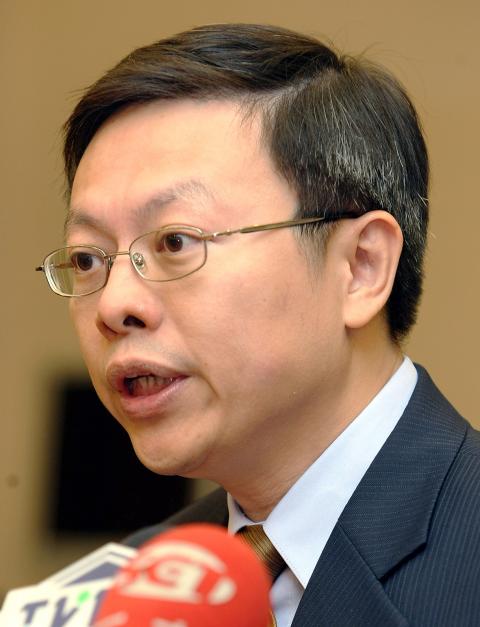Straits Exchange Foundation (SEF) Chairman Chiang Pin-kung (江丙坤) yesterday announced that he would resign next week because of health concerns and to pursue other career plans.
Chinese Nationalist Party (KMT) Secretary-General Lin Join-sane (林中森) will take over his position.
Chiang, 79, said he first offered his resignation to President Ma Ying-jeou (馬英九) on May 18 at the launch ceremony of the new SEF building in Taipei and urged the president to appoint someone as soon as possible.

Photo: CNA
Chiang added that he decided to announce his resignation this time before receiving an official confirmation from the Presidential Office because the SEF is holding a board meeting today.
“Because of my age, health and career plans, I decided to offer my resignation and hand over the important duty of managing cross-strait affairs to other cross-strait experts,” he said yesterday in an impromptu press conference at the SEF.
Chiang thanked Ma for trusting him with the position, while dismissing accusations that he and his family have close business ties in China.
“I hope my resignation will make all groundless accusations against me and my family members disappear as well,” he said.
The Presidential Office later said Ma had approved Chiang’s resignation and Lin would take over as SEF chairman.
SEF Vice Chairman Kao Koong-lian (高孔廉) also offered his resignation yesterday.
During his term, Chiang has presided over eight rounds of cross-strait negotiations with his Chinese counterpart, Association for Relations Across the Taiwan Straits Chairman Chen Yunlin (陳雲林), since 2008, with the two sides signing 18 agreements and the Economic Cooperation Framework Agreement (ECFA).
Chiang’s resignation was just the start of changes in the Ma administration’s cross-strait affairs personnel. The Presidential Office confirmed later yesterday that Mainland Affairs Council (MAC) Chairman Lai Shin-yuan (賴幸媛) had been appointed representative to the WTO. National Security Council adviser Wang Yu-chi (王郁琦) will take over as MAC chairman.
Wang, 49, is one of Ma’s top aides, having served as a spokesman for the Presidential Office and was involved in policymaking in Ma’s administration.
Commenting on the appointment, Wang said he would continue to promote cross-strait relations and seek to convey the government’s cross-strait policies in a clear and accurate manner.
Lai said she would take advantage of her four years of experience at the MAC to promote the nation’s global participation at the WTO, based on the success of the Ma administration’s cross-strait policies.
The personnel changes will take effect later this month.

INVESTIGATION: The case is the latest instance of a DPP figure being implicated in an espionage network accused of allegedly leaking information to Chinese intelligence Democratic Progressive Party (DPP) member Ho Jen-chieh (何仁傑) was detained and held incommunicado yesterday on suspicion of spying for China during his tenure as assistant to then-minister of foreign affairs Joseph Wu (吳釗燮). The Taipei District Prosecutors’ Office said Ho was implicated during its investigation into alleged spying activities by former Presidential Office consultant Wu Shang-yu (吳尚雨). Prosecutors said there is reason to believe Ho breached the National Security Act (國家安全法) by leaking classified Ministry of Foreign Affairs information to Chinese intelligence. Following interrogation, prosecutors petitioned the Taipei District Court to detain Ho, citing concerns over potential collusion or tampering of evidence. The

‘FORM OF PROTEST’: The German Institute Taipei said it was ‘shocked’ to see Nazi symbolism used in connection with political aims as it condemned the incident Sung Chien-liang (宋建樑), who led efforts to recall Democratic Progressive Party (DPP) Legislator Lee Kun-cheng (李坤城), was released on bail of NT$80,000 yesterday amid an outcry over a Nazi armband he wore to questioning the night before. Sung arrived at the New Taipei City District Prosecutors’ Office for questioning in a recall petition forgery case on Tuesday night wearing a red armband bearing a swastika, carrying a copy of Adolf Hitler’s Mein Kampf and giving a Nazi salute. Sung left the building at 1:15am without the armband and apparently covering the book with a coat. This is a serious international scandal and Chinese

Seventy percent of middle and elementary schools now conduct English classes entirely in English, the Ministry of Education said, as it encourages schools nationwide to adopt this practice Minister of Education (MOE) Cheng Ying-yao (鄭英耀) is scheduled to present a report on the government’s bilingual education policy to the Legislative Yuan’s Education and Culture Committee today. The report would outline strategies aimed at expanding access to education, reducing regional disparities and improving talent cultivation. Implementation of bilingual education policies has varied across local governments, occasionally drawing public criticism. For example, some schools have required teachers of non-English subjects to pass English proficiency

TRADE: The premier pledged safeguards on ‘Made in Taiwan’ labeling, anti-dumping measures and stricter export controls to strengthen its position in trade talks Products labeled “made in Taiwan” must be genuinely made in Taiwan, Premier Cho Jung-tai (卓榮泰) said yesterday, vowing to enforce strict safeguards against “origin laundering” and initiate anti-dumping investigations to prevent China dumping its products in Taiwan. Cho made the remarks in a discussion session with representatives from industries in Kaohsiung. In response to the US government’s recent announcement of “reciprocal” tariffs on its trading partners, President William Lai (賴清德) and Cho last week began a series of consultations with industry leaders nationwide to gather feedback and address concerns. Taiwanese and US officials held a videoconference on Friday evening to discuss the